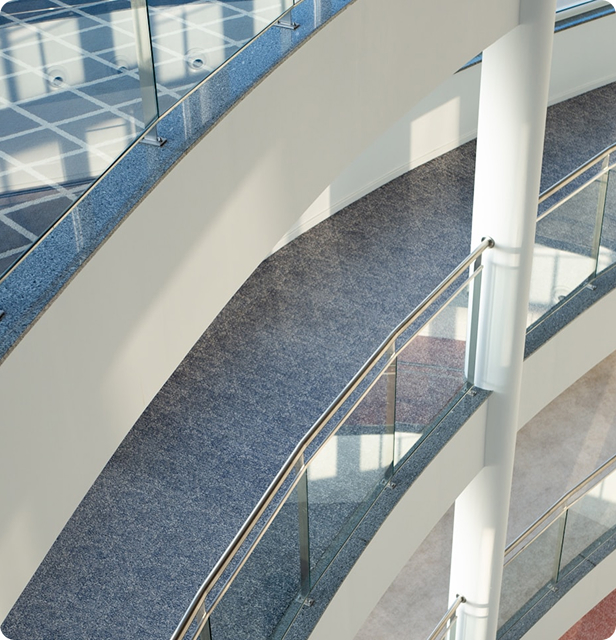What Makes a Maintenance and Cleaning Vendor Reliable in High-Risk Industries?
In industries where health, safety, and security are non-negotiable, there’s no room for cutting corners. Whether it’s a busy airport terminal, a medical facility, or a secure government building, how spaces are cleaned and maintained directly affects people’s wellbeing and the organization’s ability to operate smoothly.It’s not just about looking clean. In high-risk environments, your maintenance and janitorial team plays a critical behind-the-scenes role in keeping things compliant, safe, and operational every single day. So when it comes to selecting a vendor, the word “reliable” carries real weight.Let’s break down what reliability really means and what to look for when evaluating your vendor.

Understanding High-Risk Environments
Not all buildings are created equal. Some facilities, like hospitals, data centers, aviation terminals, or government offices, carry higher levels of operational risk. A misstep in these spaces can impact public safety, regulatory compliance, or sensitive operations.
High-risk industries require more than routine cleaning. They demand a service partner who understands:
- Strict compliance standards (like OSHA, HIPAA, TSA, or FDA).
- Controlled access and security protocols.
- Health-critical tasks such as disinfection, air quality management, and infection control.
- Zero-tolerance for downtime.
In these environments, reliability isn’t just a bonus. It’s a business necessity.
What Makes a Vendor Truly Reliable?
So what does a reliable cleaning and maintenance partner look like? Here are the key qualities that matter most in high-risk spaces:
1. Certification and Ongoing Training
Reputable vendors invest in proper certification, not just for the company, but for every technician on the ground. Look for credentials like ISSA-CIMS, Green Seal™, or GBAC STAR Accreditation. These show a baseline commitment to professional standards, safety, and sustainability.
Training should be ongoing, not a one-time orientation. Reliable vendors provide routine refreshers on safety, equipment, protocols, and emerging risks.
2. Workforce Screening
In sensitive industries, not everyone can walk in and clean. Thorough background checks, identity verification, and clearance protocols are a must. Ask whether the staff has been vetted, trained for site-specific risks, and clearly identified on the job.
3. Safety Protocols
A good vendor has clear, written safety policies—and enforces them. That means proper PPE use, hazard communication, risk assessments, and training around biohazards or dangerous materials.
Ask: Can they show documentation? Can their frontline workers speak to the protocol?
4. Consistency in Service
Consistency isn’t just about cleaning to a checklist, it’s about accountability. The best vendors use digital tracking systems and quality control audits to verify that work was completed to standard and on time. Look for companies that offer real-time reporting, service logs, and checklists.
5. Confidentiality and Controlled Access
If your facility involves sensitive data, secure assets, or protected health information, confidentiality is a priority. Look for vendors who:
- Require signed confidentiality agreements
- Limit staff access by zone
- Track entry/exit logs and ID badges
- Understand the importance of discretion
Why CSM America?
A reliable vendor doesn’t just work in the background, they communicate clearly and proactively.
Whether it’s a routine shift, an unexpected incident, or a last-minute request, you need a team that’s responsive and transparent. This includes:
- Open communication channels with account managers
- Real-time reporting tools (like JAMS or other CMMS software)
- Incident escalation protocols so nothing slips through the cracks
- Audit trail logs for inspections or regulatory reviews
In high-risk industries, knowing what’s been done and when is just as important as the task itself.
Proven Experience in High-Risk Environments
There’s no substitute for experience. A cleaning company that’s worked with secure airports or high-traffic hospitals brings valuable knowledge that others can’t replicate.
Ask for:
- Relevant references in your industry
- Case studies that demonstrate successful outcomes
- Service delivery metrics like response times, issue resolution, or downtime reduction
You want a partner who’s done this before and done it well.
How to Choose the Right Vendor (Without Guesswork)
When it comes time to evaluate or replace your vendor, here are a few practical steps:
✅ Ask for certifications and safety documentation
✅ Verify training and staff screening processes
✅ Request a site-specific service plan
✅ Review service level agreements (SLAs)
✅ Set expectations for reporting and communication
✅ Consider a pilot program before signing a long-term contract
✅ Ask for data—how do they track quality and resolve issues?
Don’t be afraid to get specific. The more detail a vendor can provide, the more likely they’re truly equipped for high-risk environments.
The Bottom Line
In secure and high-stakes industries, cleaning and maintenance are more than operational tasks—they’re part of your safety, your compliance, and your reputation.
A reliable vendor is:
- Certified, trained, and accountable
- Transparent and proactive in communication
- Experienced in regulated industries
- Committed to consistent, high-quality service
If your current provider can’t confidently check those boxes, it might be time to explore other options.
Ready to Partner with a Trusted Expert?
At CSM America, we’ve earned the trust of Fortune 500 clients and government agencies alike. Our teams are trained, certified, and ready to meet the unique demands of high-risk industries—safely, consistently, and with full transparency.
📍 Atlanta, GA
Visit www.csmamerica.com to request a quote or schedule a site consultation.
FAQs: Vendor Reliability in High-Risk Industries
Q: How often should vendors provide documentation?
A: At a minimum, vendors should provide shift logs, inspections, and incident reports weekly—more frequently in high-risk areas.
Q: What certifications matter most?
A: Look for ISSA-CIMS, GBAC STAR, Green Seal™, OSHA-10/30 training, and site-specific clearances.
Q: What’s the difference between general janitorial and specialized facility maintenance?
A: Specialized vendors are trained for industry regulations, equipment handling, and high-traffic/sensitive environments. General cleaning companies often aren’t.
Stay Updated with Our Insights
Get a tailored solution for your maintenance needs with our expert services.

